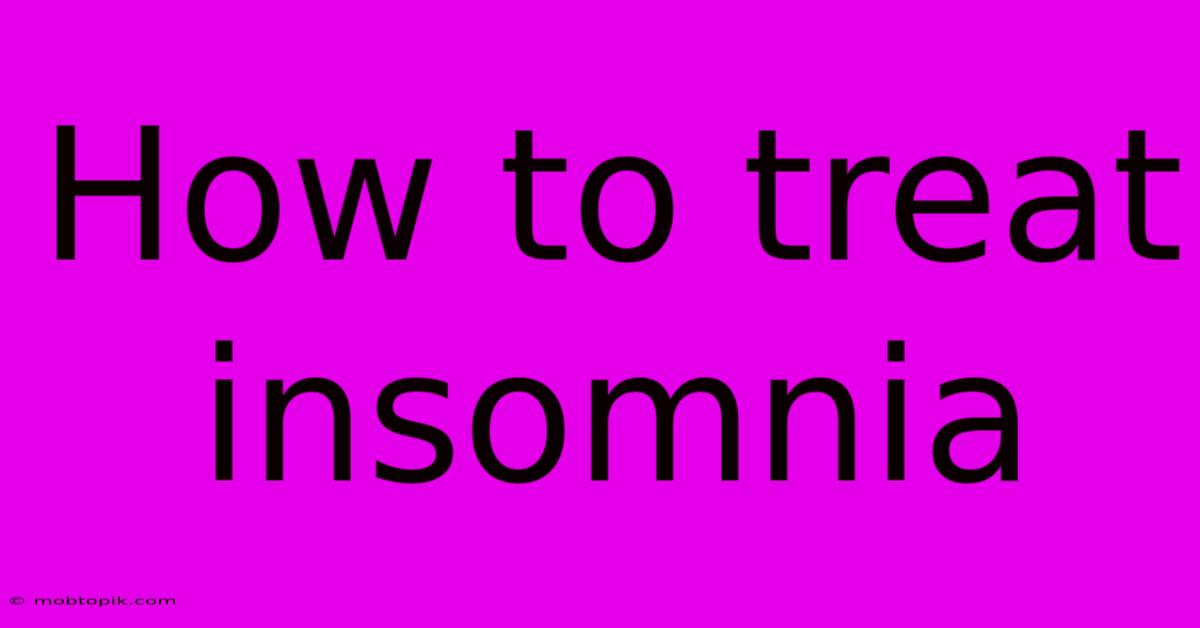How To Treat Insomnia

Discover more detailed and exciting information on our website. Click the link below to start your adventure: Visit Best Website mobtopik.com. Don't miss out!
Table of Contents
How to Treat Insomnia: A Comprehensive Guide to Better Sleep
Insomnia, the frustrating inability to fall asleep or stay asleep, affects millions worldwide. It's not just about feeling tired; it can significantly impact your mood, concentration, and overall health. But the good news is that insomnia is treatable. This comprehensive guide explores various strategies to help you conquer your sleepless nights and reclaim your rest.
Understanding the Roots of Your Insomnia
Before diving into treatment, it's crucial to understand the underlying cause of your insomnia. Is it a temporary issue triggered by stress, a life change, or jet lag? Or is it a chronic problem with a deeper root? Identifying the cause will guide your treatment approach.
Types of Insomnia:
- Acute Insomnia: This is short-term insomnia, lasting a few days or weeks. Common triggers include stress, travel, illness, or a change in work schedule.
- Chronic Insomnia: This is long-term insomnia, lasting for at least three months. It often has underlying medical or psychological causes.
- Onset Insomnia: Difficulty falling asleep.
- Maintenance Insomnia: Difficulty staying asleep, with frequent awakenings.
- Early-Morning Awakening: Waking up too early and being unable to return to sleep.
Potential Causes of Insomnia:
- Stress and Anxiety: These are major contributors to insomnia, creating a vicious cycle of worry and sleeplessness.
- Medical Conditions: Conditions like thyroid problems, heartburn, asthma, chronic pain, and neurological disorders can disrupt sleep.
- Medications: Certain medications, including some antidepressants, decongestants, and steroids, can interfere with sleep.
- Mental Health Conditions: Depression, anxiety disorders, and PTSD are strongly linked to insomnia.
- Substance Abuse: Alcohol and caffeine, while seemingly relaxing initially, can disrupt sleep patterns.
- Sleep Apnea: This sleep disorder involves pauses in breathing during sleep, leading to fragmented sleep.
- Restless Legs Syndrome (RLS): An overwhelming urge to move the legs, often accompanied by uncomfortable sensations.
- Poor Sleep Hygiene: Irregular sleep schedules, an unsuitable sleep environment, and unhealthy pre-sleep habits.
Effective Strategies to Treat Insomnia
The treatment for insomnia depends on its cause and severity. A combination of approaches is often most effective.
1. Lifestyle Changes: The Cornerstone of Insomnia Treatment
These changes address the underlying factors contributing to poor sleep and build a foundation for better sleep habits.
- Regular Sleep Schedule: Go to bed and wake up at the same time every day, even on weekends, to regulate your body's natural sleep-wake cycle.
- Create a Relaxing Bedtime Routine: Wind down an hour or two before bed with calming activities like reading, taking a warm bath, or listening to relaxing music. Avoid screens!
- Optimize Your Sleep Environment: Ensure your bedroom is dark, quiet, cool, and comfortable. Invest in comfortable bedding and consider using blackout curtains, earplugs, or a white noise machine.
- Regular Exercise: Regular physical activity can improve sleep quality, but avoid intense workouts close to bedtime.
- Diet and Nutrition: Avoid large meals, caffeine, and alcohol before bed. A light snack containing tryptophan (found in foods like turkey and bananas) can promote sleep.
- Sunlight Exposure: Getting adequate sunlight exposure during the day helps regulate your circadian rhythm.
- Cognitive Behavioral Therapy for Insomnia (CBT-I): This type of therapy helps you identify and change negative thoughts and behaviors that contribute to insomnia. It's often considered the gold standard treatment for chronic insomnia.
2. Relaxation Techniques: Calming Your Mind and Body
These techniques help reduce stress and anxiety, promoting relaxation and better sleep.
- Progressive Muscle Relaxation: This involves systematically tensing and releasing different muscle groups in your body to relieve tension.
- Deep Breathing Exercises: Slow, deep breaths can calm your nervous system and promote relaxation.
- Mindfulness Meditation: Practicing mindfulness can help you focus on the present moment, reducing racing thoughts and anxiety.
- Yoga and Tai Chi: These gentle exercises can help reduce stress and improve sleep quality.
3. Over-the-Counter Sleep Aids: A Short-Term Solution
Over-the-counter sleep aids, such as diphenhydramine (Benadryl) or melatonin, can provide temporary relief from insomnia. However, they are not a long-term solution and should be used sparingly. Always consult a doctor before using any over-the-counter medication.
4. Prescription Medications: When Necessary
In cases of severe or chronic insomnia, your doctor may prescribe sleep medications. These medications should only be used under medical supervision, as they can have side effects and potential for dependence.
5. Addressing Underlying Medical Conditions
If your insomnia is linked to a medical condition, treating the underlying problem is crucial for improving sleep. This may involve working with specialists such as cardiologists, endocrinologists, or pain management specialists.
When to Seek Professional Help
If your insomnia persists despite trying these self-help strategies, it's important to seek professional help. A doctor or sleep specialist can conduct a thorough evaluation to determine the underlying cause of your insomnia and recommend appropriate treatment. Don't hesitate to reach out for support; getting a good night's sleep is vital for your overall health and well-being.
Disclaimer: This article provides general information and should not be considered medical advice. Always consult a healthcare professional for diagnosis and treatment of insomnia or any other medical condition.

Thank you for visiting our website wich cover about How To Treat Insomnia. We hope the information provided has been useful to you. Feel free to contact us if you have any questions or need further assistance. See you next time and dont miss to bookmark.
Also read the following articles
| Article Title | Date |
|---|---|
| 29 | Nov 29, 2024 |
| Zim | Nov 29, 2024 |
| How To Treat Gallstones | Nov 29, 2024 |
| Rangers Nice I 4 1 Yendi | Nov 29, 2024 |
| How To Treat Stomach Ulcers | Nov 29, 2024 |
